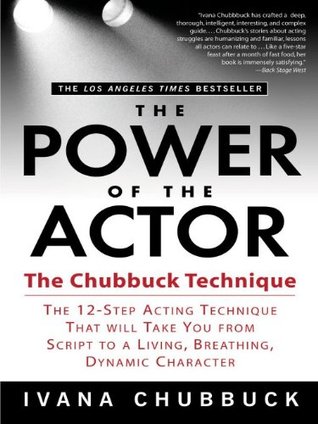Kindle Notes & Highlights
A winner doesn’t have to actually win to be a winner—a winner tries to win, a loser accepts defeat.
Without the purpose of a goal, without the struggle to win, the purely emotional actor will be a victim to the circumstances of the script, and no one likes to watch a victim be a victim. We want to watch a person change their life, not accept abuse.
The better the actor is at accessing his life experiences as a way of creating urgency and passion for the goals in the script, the higher the art.
the OVERALL OBJECTIVE is the main need that drives your character.
Your OVERALL OBJECTIVE should always be a basic human need, a primal goal
Your pure concentration on accomplishing a goal makes you unaware of what you look like, and allows your naturally distinctive mannerisms and quirks to come forward.
For an actor, the OVERALL OBJECTIVE fills in aspects of plot and gives them a high-stakes, viable way to personalize the role.
The OVERALL OBJECTIVE essentially constructs a journey for the actor and the audience. At the beginning of a play or a film, the character (and actor) starts at A, at ground zero. This is where they need to establish the goal they need to accomplish. The rest of the play or film is how that particular character goes about accomplishing the goal to ultimately earn the right to get to Z.
The script informs the raw material to be analyzed, providing the specific information that makes a character do what they have to do.
Your character’s OVERALL OBJECTIVE must be worded in a way that establishes a change in their life that is necessary for physical and/or emotional survival.
OVERALL OBJECTIVE is not about plot.
The OVERALL OBJECTIVE has to be a simple, bottom-line, primal need that will make sense throughout the script.
Where your character begins and where your character ends up provides clues as to what your OVERALL OBJECTIVE might be.
To find the OVERALL OBJECTIVE for your character in a script, it’s important to read the entire script more than once. By doing so, you can determine more specific elements about your character and begin to think about how the other characters relate to you and talk about you, even when you’re not there.
You must analyze the psyche of the character and find a way of making your character feel righteous in his behavior by investigating the probable primal issue(s) that makes your character behave the way he or she does today.
The SCENE OBJECTIVE is the precise way that you’re going to achieve the OVERALL OBJECTIVE, informed by the dialogue and activity of the particular scene that you’re breaking down.
Your SCENE OBJECTIVE Should Be Worded in a Way That Requires a Response
“Have I worded my SCENE OBJECTIVE in a way that generates a response?”
wording the SCENE OBJECTIVE so that it is basic, needy and primal.
If the SCENE OBJECTIVE changes or feels like it changes somewhere in the scene, you have picked the wrong SCENE OBJECTIVE.
think about SCENE OBJECTIVE as an affective action you need to take in order to establish a human relationship of some kind.
You have to change the other person to ultimately get what you want.
SCENE OBJECTIVE must be phrased to require a response.
Emotions are the reaction to an event or stimulus.
Let the emotions be the impetus, or motivation, to achieve your SCENE OBJECTIVE, not the end itself.
Always Make the SCENE OBJECTIVE About Relationship—Don’t Play the Plot
it answers the question, “Why does this scene exist?”
by using her incapacity, her fear and the victimization of her crippled leg to make people take care of her and love her.
Laura’s success is driven by her ability to use her supposed weaknesses to get what she wants.
Your SCENE OBJECTIVE will never be “to get you to leave me alone” or “to make the other person leave.”
If a conversation is more than two sentences, then you must have a reason to want to engage in dialogue with that person.
You can be helping a friend with a problem, with the SCENE OBJECTIVE of “to make you feel better.” But what do you get out of it? However, the SCENE OBJECTIVE “to get you to feel better so you’ll like me” gives you something in return for all your hard work. It also gives you the possibility of failure.
Generally, there’s one hot person in a scene, someone you do everything for. All the other characters then serve to be a witting or unwitting ally in your attempt to accomplish your SCENE OBJECTIVE.
You must figure out your OVERALL OBJECTIVE and then the SCENE OBJECTIVE before filling in any of your other choices.
alcohol
overcome the death of a loved one
place that contains a killer
depression
Anything that creates a hurdle, conflict, barrier or a stumbling block to accomplishing your OVERALL and SCENE OBJECTIVE is fodder for being an OBSTACLE.
(The possibility of failure, the possibility that you might not get what you want, will always be an OBSTACLE in every script you analyze.)
When you are breaking down a script and looking for OBSTACLES, find as many of them as you can—physical, emotional and mental—because the more OBSTACLES a character has to overcome, the more intricate the performance.
Others you’ll find by conjecture and supposition based on the facts of the script.
best SUBSTITUTION choices are people that are currently important to your life and are emotionally charged.
You’re going to have to look at your character’s SCENE OBJECTIVE and then at the fight in the scene.
for sexual connection you wouldn’t use a SUBSTITUTION, you would use the actor who’s right in front of you.
A SUBSTITUTION is there to provide a strong emotional connection, not a physical one.


